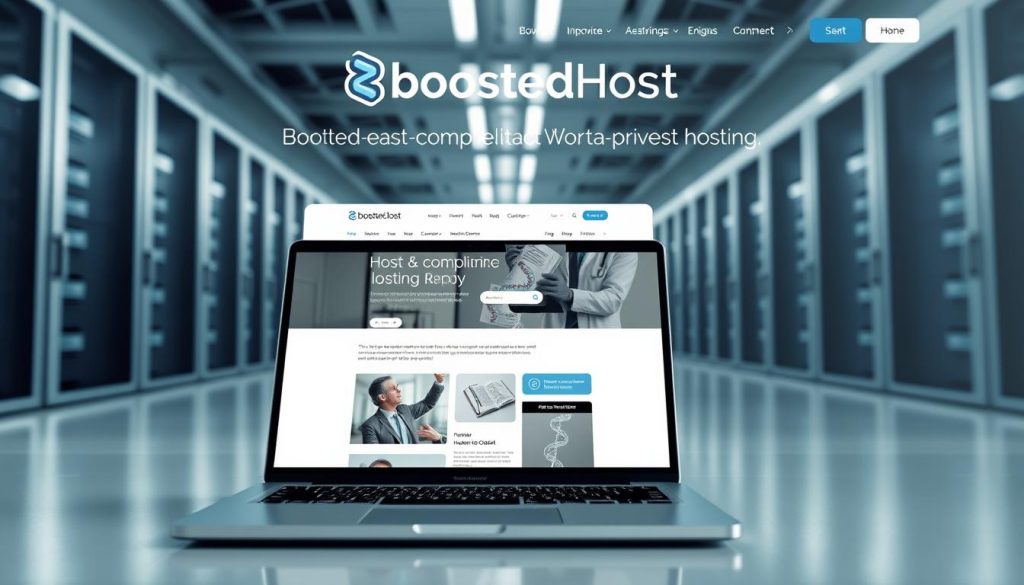Surprising fact: nearly 40% of patients will leave a slow medical site without booking an appointment, costing many practices real revenue.
You need a fast, secure web presence that keeps patient trust and search rankings. Monthly hosting is an ongoing cost, but it buys speed, backups, and recovery when things go wrong.
Choose an independent account registered in your name to avoid vendor lock‑in. Open‑source WordPress gives you flexibility compared with a closed platform managed by a single company.
Top providers bundle daily backups, CDN caching, SSL, and 24/7 support so your site stays online and your data stays safer. If you handle ePHI, look for HIPAA commitments like a BAA and private environments.
Key Takeaways
- Speed and uptime shape patient experience and SEO.
- Register the hosting account in your name to keep control.
- WordPress keeps your site flexible versus proprietary stacks.
- Choose providers with daily backups, CDN, and quick restores.
- If you process ePHI, require a BAA and auditable controls.
- Budget hosting as an operational cost to protect leads and reputation.
Why your hosting choice matters for healthcare websites right now
Your practice’s web infrastructure shapes patient experience long before they call the front desk.
Quality web hosting drives page speed and uptime. Fast pages keep patients engaged and improve search rankings. Slow sites lose visits, and that directly cuts appointment requests.
Managed plans from reputable companies add preventive care: automatic updates, anti‑hack tools, and daily backups. Those features reduce downtime and let you recover quickly when plugins or updates fail.
Use independent third‑party accounts registered in your name so you stay in control. This reduces long‑term costs and avoids being tied to a single agency or platform.
WordPress is an open platform you can host almost anywhere. It connects with HIPAA scheduling tools and patient portals without forcing a full replatform.
- Faster pages boost conversions and SEO.
- Backups and security lower recovery time after incidents.
- Managed support frees your agency to focus on marketing.
| Benefit | What it protects | Why it matters |
|---|---|---|
| Speed & CDN | Page load | Better SEO and fewer drop-offs |
| Daily backups | Data & content | Fast restores after failures |
| Managed security | Patient trust | Lower breach risk and liability |
| Independent account | Control | Avoid vendor lock‑in and ease migration |
HIPAA‑aware buying criteria: how to evaluate speed, security, and control
When patient data touches your site, you need strict controls that are verifiable and enforced. Use buying criteria that turn legal requirements into vendor commitments so you can prove compliance and run a fast, reliable site.
Non‑negotiables for PHI: require a signed BAA, a private hosted environment (no shared cPanel), SSL encryption in transit, and enforced MFA for admin access.
Ask for detailed audit trails and access logs so you can show who accessed data and when. Validate that backups exist both onsite and offsite and that restores are tested regularly.
- Demand 24/7 monitoring and quick response, not next‑day tickets.
- Prioritize optimized servers, integrated CDN, and caching for speed with documented uptime SLAs.
- Choose open‑source WordPress on an independent account to keep control and avoid vendor lock‑in.
| Focus | What to verify | Why it matters |
|---|---|---|
| Security measures | BAA, encryption, MFA, audit logs | Reduces breach risk and clarifies responsibility |
| Performance | Servers, CDN, caching, SLA | Keeps pages fast and patients engaged |
| Control | Independent provider, platform docs, change management | Makes migration and governance simpler |
Top HIPAA‑compliant hosting providers for protected health information
When patient records touch your site, pick providers that publish clear BAAs and documented recovery plans. These vendors pair audited controls with disaster recovery and ongoing monitoring.
Quick provider highlights:
- AWS: BAA options, granular IAM, autoscaling, and global backups for elastic capacity.
- Azure: HIPAA and HITRUST alignment, ISO certifications, and regional data residency controls.
- Atlantic.Net: SOC audits, MFA, encrypted VPNs, offsite backups, and white‑glove managed support.
- Liquid Web: Preconfigured HIPAA plans, locked server cabinets, high‑availability power, and 24/7 onsite support.
- HIPAA Vault: BAAs, managed firewalls, SSL, 2FA, and 24/7 monitoring with strong uptime claims.
- Rackspace: HITRUST‑certified architectures plus advisory services for design and migration.
“Clarify backup retention, log windows, patch schedules, and response SLAs before you sign.”
| Provider | Key compliance features | Support model | Ideal if your team… |
|---|---|---|---|
| AWS | BAA, IAM, global backups | Self‑managed / partner | has cloud engineers |
| Azure | HIPAA, HITRUST, regional data | Platform + managed options | wants Microsoft stack |
| Atlantic.Net | SOC 2/3, MFA, offsite backups | Managed | prefers white‑glove help |
| HIPAA Vault / Liquid Web / Rackspace | BAA, monitoring, encrypted servers | Fully managed | needs turnkey compliance |
Match your choice to internal skills and split PHI systems from public marketing sites. If you want a checklist to compare options, see our compliant hosting choices.
Fast WordPress hosting for health marketing sites without storing PHI
If your site only markets services and never stores patient records, pick a fast managed WordPress plan that prioritizes performance. Focus on caching, CDN, tested backups, and staging so updates don’t break the live site.

Top practical options
SiteGround
GrowBig includes automatic WordPress updates, daily backups (30 copies), free SSL, SuperCacher, CDN, free migration, multi‑site, and 24/7 support. Renewal rates rise after intro pricing.
Bluehost
Beginner friendly with a guided WordPress setup and AI website builder. The dashboard is simple and is recommended by WordPress.org for easy starts.
GreenGeeks
Offers PowerCacher, nightly and on‑demand backups, account isolation for stability, and a 300% green energy match for eco‑minded practices.
Hostinger
Budget managed WordPress with lower renewals, an AI builder to speed launches, and flexible payment options including crypto.
InMotion Hosting
Max Speed Zones for regional performance, solid cPanel control, strong uptime guarantees, and a 90‑day money‑back window.
- Pick a managed web host when your website is marketing-only to save time and reduce risk.
- Prioritize caching, CDN, PHP optimizations, and reliable backups to protect content.
- Keep business email on Google Workspace or Microsoft 365 to preserve deliverability and simplify migrations.
- Always check that plans include staging and confirm renewal pricing before you commit.
| Company | Key features | Good if you want… |
|---|---|---|
| SiteGround | SuperCacher, daily backups, CDN | balanced performance & support |
| Bluehost | AI builder, guided setup | easy launches |
| GreenGeeks | PowerCacher, nightly backups, green energy | eco focus |
Ecommerce and patient‑facing services: choosing the right web host for online payments and products
Ecommerce needs change fast—start with a platform that lets you go live quickly and scale as orders rise. Your choice should balance launch speed, payment security, and future performance.
Shopify is a hosted platform with polished templates that get a wellness store live fast. It reduces maintenance so you can focus on product listings and marketing.
Nexcess Managed WooCommerce is a tuned WordPress solution built for larger catalogs and peak promotions. Expect optimized database performance and expert support when traffic spikes.
InMotion + WooCommerce gives you more control via cPanel and is cost‑effective if you prefer managing the stack yourself. It’s a practical option when you need flexibility without premium managed fees.
“Keep patient‑facing services HIPAA‑aware—use dedicated, compliant tools for scheduling and billing rather than storing PHI in your CMS.”
- Compare plans for PCI compliance, fraud protections, and checkout optimizations that cut cart abandonment.
- Prefer providers that include CDN, object caching, and image optimization to protect performance during campaigns.
- Map fulfillment and tax workflows early so the solution integrates with shipping and inventory tools you need.
- Budget for apps and plugins—small monthly add‑ons can raise your total cost quickly.
| Platform | Strength | Good if you want… |
|---|---|---|
| Shopify | Fast setup, templates, built‑in payments | quick launches with minimal upkeep |
| Nexcess WooCommerce | Performance tuning, expert support | scalable WordPress stores and promos |
| InMotion + WooCommerce | Control, cPanel, cost efficiency | manage your stack and reduce fees |
best hosting for doctors websites: picks by practice size, specialty, and needs
Keep PHI separate from public content and pick a provider based on how much compliance and scale your practice needs.

Solo practice
If you collect PHI via forms or telehealth, choose HIPAA Vault or Atlantic.Net. Both include BAAs, 24/7 monitoring, MFA/2FA, SSL, and offsite backups so you get managed compliance without heavy ops.
If your site only markets services and never stores patient records, a fast managed WordPress option like SiteGround keeps content delivery simple and affordable.
Group practice or multi‑provider clinic
Pick a managed service such as Liquid Web or Rackspace to reduce your compliance burden. These providers add high availability, secure cabinets or HITRUST‑aligned architectures, and 24/7 support when clinical access matters.
Multi‑location network
Use AWS or Azure when you need governance, regional controls, and observability at scale. These cloud platforms offer BAAs and fine‑grained access management, but they work best if your team has cloud skills.
Specialists needing portals or scheduling
Keep PHI in dedicated, HIPAA‑aware services like Zocdoc or LocalMed and embed those flows into WordPress. This preserves control over content while isolating sensitive patient data.
- Match options to your internal team: managed providers if you want less to run; hyperscalers if you want granular control.
- Prioritize support response times when appointments depend on uptime.
- Confirm admin access levels so clinicians don’t gain unnecessary permissions.
| Practice type | Recommended provider | Why it fits |
|---|---|---|
| Solo (PHI) | HIPAA Vault / Atlantic.Net | BAA, 24/7 monitoring, MFA, offsite backups |
| Solo (marketing only) | SiteGround | Fast WordPress, staging, daily backups |
| Group clinic | Liquid Web / Rackspace | Managed HIPAA plans, high availability, advisory support |
| Multi‑location | AWS / Azure | Scale, governance, regional residency controls |
Implementation workflow: HIPAA‑aware setup for speed and reliability
Start your rollout with clear role definitions and signed agreements so responsibility is never ambiguous. Sign BAAs with any provider or vendor that may touch ePHI and document internal duties for handling protected data.
Staging and version control keep your live site safe. Stand up a staging website, test plugin and theme updates there, and use a simple changelog so you can roll back quickly if something breaks.
Enforce SSL sitewide, redirect HTTP to HTTPS, and automate certificate renewals. Use least‑privilege access, audit permissions regularly, and require MFA on all admin accounts to tighten access and control.
Configure automated daily backups to local servers plus secure offsite retention and run restore drills quarterly. Turn on 24/7 monitoring and define incident response paths—who’s on call, how to escalate, and how to notify stakeholders.
Keep email off your web host. Use dedicated platforms like Google Workspace or Microsoft 365 for reliable deliverability, archiving, and easier vendor changes.
| Focus | Action | Why it matters |
|---|---|---|
| Backups | Daily local + offsite | Fast restores after failures |
| Monitoring | 24/7 alerts & response | Reduce downtime and data risk |
| Account control | BAA + least‑privilege | Clear responsibility and auditability |
| Environment | Staging + versioning | Safer updates and stable content |
“Document security measures and keep a tight change log; audits and incident drills are only useful if someone can show the records.”
Pricing, renewals, and contracts: what affects your total cost of ownership
Plan costs add up quickly unless you compare what each company actually includes. Start by reading the fine print on bandwidth, backup retention, and support SLAs. Many agencies resell hosting services at a markup, so buying directly from a reputable provider and keeping the account in your name saves money and avoids vendor lock‑in.
Managed HIPAA vs self‑managed cloud
Managed HIPAA vs self‑managed cloud: cost, complexity, and in‑house IT
Managed HIPAA plans bundle compliance features and 24/7 support into predictable plans. That reduces the need for in‑house engineers and lowers operational risk.
Self‑managed cloud on AWS or Azure can look cheaper at low usage, but you must factor engineering time, monitoring, and backup validation into your total cost. If you lack cloud skills, those hidden labor costs can exceed the raw provider bill.
Intro deals vs renewals: avoiding overpaying and vendor lock‑in
Watch intro pricing closely. SiteGround and similar companies offer low first‑term rates that jump at renewal. WP Engine charges a premium for performance and hands‑on management.
Practical checklist
- Compare hosting services apples‑to‑apples: bandwidth, storage, backups, security add‑ons, and SLA response times.
- Keep the account in your name to avoid inflated management fees from a middleman company.
- Choose wordpress hosting or web hosting plans that include staging, CDN, and tested restores to reduce future add‑ons.
- Factor compliance costs (log retention, backup storage, security scans) and the cost of downtime into your business model.
| Option | Likely cost drivers | When it fits |
|---|---|---|
| Managed HIPAA plan | Flat monthly fee, compliance bundle, support | If you want predictable costs and less IT burden |
| Self‑managed cloud | Pay‑as‑you‑go compute, storage, engineering hours | If you have cloud engineers and need scale flexibility |
| Agency resell | Markup, bundled support | Good for one‑stop service — avoid if they keep the account |
Exit strategy: pick plans with clear export tools and no punitive contract terms. Ask about upgrade/downgrade flexibility so you can scale without surprises when demand changes in the market.
Conclusion
strong, wrap up by matching technical needs to patient privacy and team skills. Choose HIPAA‑capable names like AWS, Azure, Atlantic.Net, Liquid Web, HIPAA Vault, or Rackspace when ePHI is involved.
For public content, use fast managed options such as SiteGround, Bluehost, GreenGeeks, Hostinger, or InMotion so your website stays quick and reliable. Confirm SSL, encryption, MFA, audit trails, and onsite/offsite backups before you buy.
Keep email on a dedicated platform and hold the account in your name to avoid vendor lock‑in. Separate PHI workflows from marketing so patient data stays protected while your marketing site stays nimble and high in performance.
Next step: shortlist 2–3 providers from each track, run a short pilot that tests backups, restores, and logs, and then pick the one that fits your care model and growth needs.
FAQ
How do I know if a provider is HIPAA‑aware and can protect ePHI?
Check that the provider signs a Business Associate Agreement (BAA), offers private or dedicated environments (not just shared servers), and documents encryption at rest and in transit. Look for multi‑factor authentication (MFA), audit logs, and 24/7 monitoring. Also verify third‑party certifications like SOC 2 or HITRUST and read their disaster recovery and backup policies.
Can I use WordPress for a clinic site that handles appointments and patient forms?
Yes, if you avoid collecting protected health information (PHI) on the public site or you pair WordPress with HIPAA‑compliant form and portal vendors that sign BAAs. For any ePHI, host on a private environment that supports encryption, role‑based access, and logging. Use reputable plugins and keep them updated, and use staging before any changes.
What hosting features actually improve site speed for patient traffic?
Prioritize optimized server stacks, a global CDN, server‑side caching, and HTTP/2 or HTTP/3 support. Low latency and solid uptime SLAs matter for telehealth and scheduling pages. Choose a plan with resource isolation (dedicated CPU/RAM) and consider regional data centers near your patient base to lower response times.
Should I separate email from my web platform?
Yes. Use a dedicated business email provider (Google Workspace, Microsoft 365, or another secure mail service) rather than relying on bundled webmail. That improves deliverability, simplifies compliance, and reduces risk if your website is compromised.
How do backups and disaster recovery work for clinics?
A robust strategy uses automated daily backups, versioning, and secure offsite retention. Test restores regularly. For PHI, ensure backups are encrypted and stored in a private environment covered by the BAA. Document retention windows and restore SLAs so your practice can recover quickly after an outage or breach.
What’s the difference between managed HIPAA plans and self‑managed cloud?
Managed HIPAA plans include provider‑led security hardening, compliance documentation, and hands‑on support — useful if you lack in‑house IT. Self‑managed cloud (AWS, Azure) offers scale and control but requires technical staff to configure BAAs, encryption, audit trails, and monitoring. Costs and complexity vary, so weigh IT capacity against budget.
Which hosts are better if I don’t store PHI but need strong marketing performance?
Choose performance‑focused WordPress hosts that offer caching, free CDN, and daily backups like SiteGround, Bluehost, or InMotion. These platforms are optimized for speed and SEO, and they pair well with marketing tools and analytics while keeping patient data off the site.
How do I handle online payments and ecommerce for health products?
Use PCI‑compliant platforms like Shopify for small stores or Nexcess Managed WooCommerce for WordPress shops. Keep payment processing off your main site by using hosted checkout providers (Stripe, PayPal) to reduce PCI scope and security burden. Ensure any customer data storage complies with privacy rules.
What controls prevent vendor lock‑in and preserve flexibility?
Favor open standards and open‑source tools (WordPress, WooCommerce), exportable data formats, and providers that let you migrate easily. Avoid proprietary site builders that restrict code access. Choose independent providers that support standard backups and database exports so you can move when needed.
How do regional data residency and observability affect my choice?
If your practice needs specific data residency (state or country), pick a provider with regional data centers and controls for data locality. Observability—logging, metrics, and tracing—helps you detect incidents and meet audit requirements. Large cloud providers like AWS and Azure offer fine‑grained regional controls and monitoring tools.
What are the minimum security controls I should require in a plan?
At minimum, require a signed BAA, encryption in transit and at rest, MFA for admin access, role‑based access control, audit trails, secure backups, and incident response procedures. Regular vulnerability scanning and timely patching are also essential to protect patient and practice data.
How should I budget for renewals and total cost of ownership?
Account for the initial setup, ongoing managed services or cloud fees, backup and monitoring costs, and potential higher renewals after intro pricing. Factor in IT time, compliance audits, and any third‑party tools (email, forms, scheduling). Compare managed HIPAA plans versus self‑managed cloud to understand real long‑term costs.




